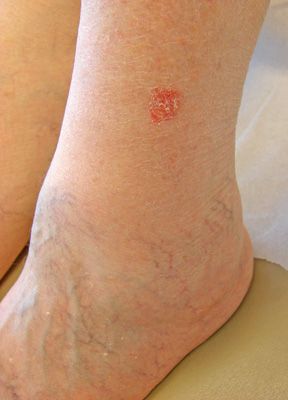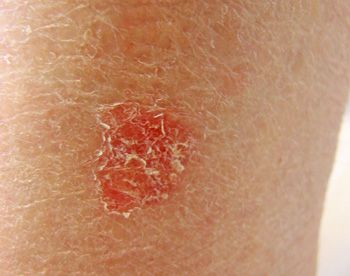- Clinical Technology
- Adult Immunization
- Hepatology
- Pediatric Immunization
- Screening
- Psychiatry
- Allergy
- Women's Health
- Cardiology
- Pediatrics
- Dermatology
- Endocrinology
- Pain Management
- Gastroenterology
- Infectious Disease
- Obesity Medicine
- Rheumatology
- Nephrology
- Neurology
- Pulmonology
Squamous Cell Carcinoma In Situ (Bowen Disease)
With no history of papulosquamous skin disease (eg, psoriasis), a solitary, well-demarcated, bright red scaly patch should suggest either superficial basal cell or in situ squamous cell carcinoma.
A 76-year-old man presents for his biannual total body skin examination. He has had many prior nonmelanoma skin cancers and one melanoma in situ. The asymptomatic lesion depicted is discovered on his left ankle.
Key point: Absent a history of papulosquamous skin disease, such as psoriasis, a solitary, well-demarcated, bright red scaly patch should suggest either superficial basal cell carcinoma or in situ squamous cell carcinoma. In this case, a small biopsy established the correct diagnosis: squamous cell carcinoma in situ (Bowen disease, SCCIS).
Treatment: While this lesion could be relatively easily removed by standard elliptical excision, fairly significant distal lower extremity edema was present from venous insufficiency. This posed a risk for slow postoperative healing and/or infection. Therefore, the SCCIS was treated by daily application of 5% imiquimod cream for 8 weeks. Associated with a substantial inflammatory response, the tumor resolved. After treatment cessation and frequent

application of a bland ointment, the treated area healed promptly and with a good cosmetic outcome.
Note: Although imiquimod is not FDA-approved for the treatment of any type of squamous cell carcinoma, SCCIS may respond quite well to this modality.

